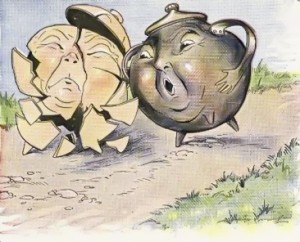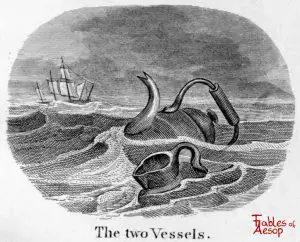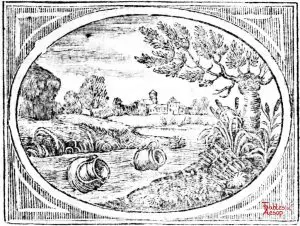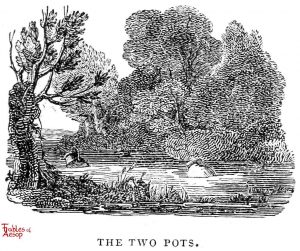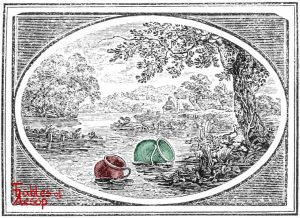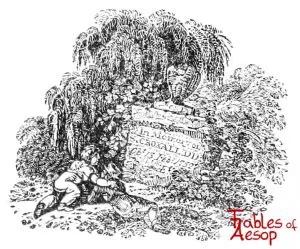Two pots, metal and clay, float down a waterway. The metal pot asks the clay to be close; the clay demurs fearing breakage.
Equals make the best friends.

Eliot/Jacobs Version
Two Pots, one of brass, and one of earthenware floated down the stream. The earthenware pot tried its best to keep apart from the brass one, which cried out: “Fear nothing, friend, I will not strike you.” “But I may come in contact with you,” said the other, “if I come too close; and whether I hit you, or you hit me, I shall suffer.”

Aesop For Children
Two Pots, one of brass and the other of clay, stood together on the hearthstone. One day the Brass Pot proposed to the Earthen Pot that they go out into the world together. But the Earthen Pot excused himself, saying that it would be wiser for him to stay in the corner by the fire.
“It would take so little to break me,” he said. “You know how fragile I am. The least shock is sure to shatter me!”
“Don’t let that keep you at home,” urged the Brass Pot. “I shall take very good care of you. If we should happen to meet anything hard I will step between and save you.”
So the Earthen Pot at last consented, and the two set out side by side, jolting along on three stubby legs first to this side, then to that, and bumping into each other at every step.
The Earthen Pot could not survive that sort of companionship very long. They had not gone ten paces before the Earthen Pot cracked, and at the next jolt he flew into a thousand pieces.
Moral
Equals make the best friends.

Jefferys Taylor (The Two Vessels)
I’LL tell you a tale:—two vessels set sail,
Without either captain or crew!
Your wonder to settle,—they were a brass kettle,
An earthenware porringer too.
“O dear!” said the latter: “Friend, what is the matter?”
The kettle demanded, at last.
Said the pitcher, “I think I shall certainly sink,
I am filling with water so fast.”
“Oh! be not afraid, I will lend you my aid;
Hook on to my spout,” said the kettle.
Said the pitcher, “O dear, it is you that I fear,
Since if we come nigh, of the blow I must die;
For I’m earthen, but you are of metal.”
As weak folks oft suffer by strong ones, I say
That the weaker had better keep out of their way.

Townsend version
A river carried down in its stream two Pots, one made of earthenware and the other of brass. The Earthen Pot said to the Brass Pot, “Pray keep at a distance and do not come near me, for if you touch me ever so slightly, I shall be broken in pieces, and besides, I by no means wish to come near you.”
Moral
Equals make the best friends.

Samuel Croxall
AN Earthen Pot, and one of Brass, standing together upon the river’s brink, were both carried away by the flowing in of the tide. The Earthen Pot showed some uneasiness, as fearing he should be broken; but his companion of Brass bid him be under no apprehension, for that he would take care of him. O, replies the other, keep as far off as ever you can, I entreat you; it is you I am most afraid of: for, whether the stream dashes you against me, or me against you, I am sure to be the sufferer and therefore, I beg of you, do not let us come neap one another.
THE APPLICATION
A man of a moderate fortune, who is contented with what he has, and finds he can live happily upon it, should take care not to hazard and expose his felicity by consorting with the great and the powerful. People of equal conditions may float down the current of life without hurting each other: but, it is a point of some difficulty to steer one’s course in the company of the great, so as to escape without a bulge. One would not chuse to have one’s little country box situated in the neighbourhood of a very great man; for whether I ignorantly trespass upon him, or he knowingly encroaches upon me, I only am like to be the sufferer. I can neither entertain nor play with him, upon his own terms; for that which is moderation and diversion to him, in me would be extravagance and ruin.

Thomas Bewick
An earthen Pot, and one of brass, standing together upon the brink of a river, were both carried away by the sudden rise of the water. The earthen Pot shewed some uneasiness, fearing he should be broken; but his companion of brass bade him be under no apprehension, as he would take care of him. Oh! replies the other, keep as far off as you can, I entreat you: it is you I am most afraid of; for whether the stream dash you against me, or me against you, I am sure to be the sufferer, and, therefore, I beg of you do not let us come near one another.
APPLICATION.
A man of moderate fortune, who is contented with what he has, and finds he can live happily upon it, should be particularly guarded against the ill-judged ambition of associating with the rich and powerful, for what in them is oeconomy [Sic], would in him be the height of extravagance; and at the very time they honour him with their countenance, they are leading him on to his ruin. People of equal conditions may float down the current of life without hurting each other; but it is no easy matter to steer one’s course in company with the great, so as to escape without a bulge: neither is it desirable to live in the neighbourhood of a very great man; for whether we ignorantly trespass upon him, or he knowingly encroach upon us, we are sure to be the sufferers.

JBR Collection
A river having overflowed its banks, two Pots were carried along in the stream, one made of Earthenware and the other of Brass. “Well, brother, since we share the same fate, let us go along together,” cried the Brazen Pot to the Earthen one. “No, no!” replied the latter in a great fright; “keep off whatever you do, for if you knock against me, or I against you, it will be all over with me–to the bottom I shall go.”

Crane Poetry Visual

“Never fear!” said the Brass to the Clay
Of two jars that the flood bore away.
“Keep you close to my side!”
But the porcelain replied,
“I’ll be smashed if beside you I stay.”
Our friend our enemy.

Ollae Duae
Duae ollae stetere in ripa; altera erat lutea, altera aerea. Utramque tulit vis fluvii. Luteae collisionem metuenti, respondit aerea ne quid timeat; sese enim, ne collidantur, satis curaturam. Tum altera “Seu me,” inquit, “tecum seu te mecum flumen colliserit, cum meo utrumque fiet periculo. Quare certum est a te separari.”
Moral
Satius est vivere cum socio pari quam cum potentiori. A potentiori enim potest esse periculum tibi, non illi a te.
Perry #378
